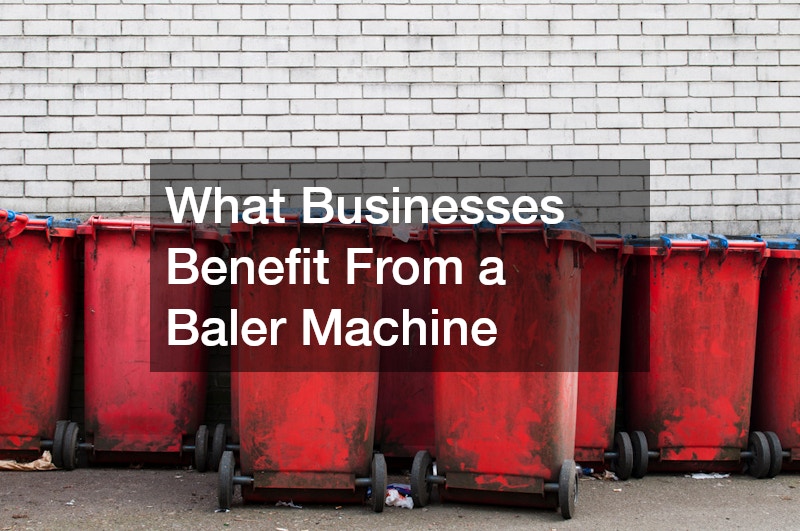
In today’s eco-conscious economy, effective waste management and recycling are crucial for businesses across various industries. One machine that plays a significant role in this process is the baler machine. This article explores which businesses benefit from using a baler machine by addressing frequently asked questions and key considerations.
What is a Baler Machine and How Does it Work?
Overview of Baler Machines
Baler machines are devices used to compress materials into compact bales for easier handling and recycling. They come in various types, including vertical and horizontal balers, each designed to cater to specific needs and volumes of waste.
By converting loose recyclables into dense bales, baler machines significantly reduce the space required for waste storage. This efficiency is crucial for maintaining clean and organized work environments in numerous industrial applications.
Besides waste volume reduction, balers help in segregating materials like cardboard, paper, plastics, and textiles. This separation is vital for effective recycling, allowing businesses to contribute more readily to the circular economy.
How Do Baler Machines Operate?
Baler machines operate by applying substantial pressure to compress waste materials into tightly packed cubes or rectangles. The process typically involves loading the material, activating the hydraulic or mechanical press, and securely tying the finished bale with wire or twine.
The operation of a baler machine requires minimal human intervention, making it a time-efficient solution for businesses. With automated features, modern balers can manage various types of waste, improving productivity and consistency in waste handling.
Many balers are equipped with sensors and operational indicators to ensure safety and efficiency during the compression process. These technological advancements align with the company’s goals to reduce labor costs and enhance safety measures.
Why is a Baler Machine Important for Retail Businesses?
Reducing Waste Disposal Costs
Retail businesses often deal with large volumes of packaging waste, which can be costly to dispose of through traditional waste management systems. Baler machines can help these businesses significantly cut down on waste disposal expenses by compacting recyclables, thus requiring fewer waste pickups.
Minimizing waste bulk leads to reduced transportation costs, as more material can be transported in fewer trips. Additionally, compacted bales are easier to handle and load for recycling, creating further savings for retail operations.
Moreover, many municipalities offer incentives or rebates for companies actively engaging in comprehensive recycling programs. Utilizing balers allows retail businesses to take full advantage of these financial opportunities, further decreasing their operational costs.
Enhancing Sustainability Initiatives
Baler machines support retail businesses in achieving their sustainability goals by promoting recycling and reducing landfill waste. This aligns with the growing consumer demand for environmentally responsible companies, enhancing brand image and customer loyalty.
Implementing baler machines enables retailers to more effectively segregate and compact recyclable materials such as cardboard and plastics. This action showcases a commitment to environmental stewardship, resonating well with eco-conscious consumers.
Furthermore, by actively reducing waste footprints, retail businesses using baler machines can contribute to broader community and environmental goals. This not only boosts corporate social responsibility efforts but also attracts partnerships with like-minded organizations.
How Do Manufacturing Companies Benefit from Baler Machines?
Managing Bulk Waste
Manufacturing companies generate substantial amounts of scrap materials and waste byproducts, which can quickly accumulate and hinder operations. Baler machines offer an effective solution for managing bulk waste, ensuring waste does not impede production processes.
By compacting large quantities of materials like scrap metal and cardboard, balers help maintain orderly workspaces while optimizing facility space. This advantage becomes particularly valuable in high-output manufacturing environments with limited storage capacity.
Incorporating baler machines into waste management strategies contributes to lean manufacturing practices. These practices focus on waste minimization and enhanced efficiency, which are critical for maintaining a competitive advantage.
Streamlining Recycling Processes
Baler machines enable manufacturing companies to efficiently sort and compact recyclable materials, paving the way for more streamlined recycling processes. This infrastructure supports a manufacturing operation’s pursuit of zero-waste initiatives, increasing resource recovery rates.
With improved sorting and compacting capabilities, baler machines ensure that recyclable materials are properly processed and prepared for the market. This increases the likelihood of valid yields from recycling efforts, maximizing economic returns from waste resources.
Moreover, integrating balers into existing waste management strategies enhances the overall environmental responsibility of a manufacturing business. This integration is crucial as more government regulations focus on reducing industrial waste and emissions.
Are Baler Machines Useful for Agricultural Operations?
Dealing with Agricultural Waste
Agricultural operations often generate a considerable amount of organic waste, including crop residues and produce byproducts. Baler machines provide a viable solution for handling this waste, ensuring it does not disrupt farm activities or contribute to environmental degradation.
By compacting biodegradable materials, balers help farms manage waste more practically and sustainably. This management reduces the volume of debris, thereby facilitating easier transport and disposal or reuse on the farm.
Additionally, balers enable farms to repurpose waste into valuable resources such as compost or bioenergy feedstocks. This repurposing not only alleviates environmental impact but also opens potential revenue streams for agricultural operations.
Supporting On-Farm Recycling
On-farm recycling efforts are vital for creating sustainable agricultural systems, and baler machines play a significant role in these processes. By consolidating loose straw, hay, and other materials into dense bales, farms can streamline storage and transportation logistics.
Balers also aid in the efficient recycling of silage wrap and twine, reducing dependency on landfill disposal methods. This recycling supports environmental goals and complies with agricultural best practices for farm waste management.
Furthermore, compact bales are easier to manage and feed to livestock, reducing labor costs and enhancing operational efficiency. These efficiencies can contribute to increased farm productivity and profitability over time.



